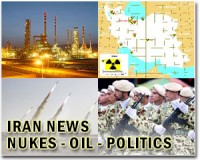| . |  |
. |
Tel Aviv, Israel (UPI) Dec 30, 2009 Amid mounting concern that Israel may unleash pre-emptive strikes against Iran to attack its nuclear facilities, some Israeli commentators are preaching restraint. They warn that Israel does not have the firepower to deliver a knockout blow to Iran's perceived drive for nuclear weapons and faces a potentially withering Iranian retaliation the likes of which they have never endured before. "It must be stated plainly: Israel does not have independent strike capability against Iran -- not in the broad sense of the term," Amos Harel wrote in the liberal daily Haaretz Wednesday. "The air force is capable of delivering a certain amount of explosives to a given target and bringing most of its aircraft back home intact. "But it is doubtful whether Israel can allow itself to act against the wishes of the United States -- to stand alone against an Iranian response and begin an open-ended operation against a nation of 70 million people," Harel wrote. "It is best to disabuse ourselves of illusions about our ability to dictate a New Middle East order. "That is the lesson learned, in blood, by Menachem Begin and Ariel Sharon in Lebanon in 1982 and by George W. Bush in Iraq in 2003." Harel and others argue that the time to hit Iran's nuclear infrastructure was several years ago, simply by taking out the uranium conversion plant at Isfahan, in central Iran, not now that the nuclear sites have been widely dispersed, buried deep underground and ringed by air-defense missiles. It is suggested that since the Israeli military has been given a large budget increase to counter the Iranian threat it feels it must "persuade the political echelon that it can do the job" or watch the funding go elsewhere. Retired Maj. Gen. Issac Ben-Israel says, "If there's no choice, Israel can set back the Iranian nuclear process" -- even if it can't mount the sustained campaign that would be required to cripple it. Ben-Israel knows what he's talking about. He was a specialist in air force operations who helped plan the long-range Israeli strike that knocked out Saddam Hussein's French-built Osirak reactor in June 1981. Many see that raid as the touchstone for a similar attack against Iran. What they forget is that involved a single target, was much closer to Israel than Iran, and took only eight F-16 strike jets to destroy -- even if it did not stifle Saddam's nuclear ambitions. Hitting widespread targets in Iran will require much of Israel's air force, including all nine of its aerial tankers to refuel up to 90-100 raiding jets flying at the limit of their capabilities and do that over several days. Ben-Israel estimates that Iran would retaliate with volleys of its Shehab-3B ballistic missiles, mainstay of its strategic missile forces, and possibly even some of the more accurate Sajjil-2 missiles. About 80 would hit the Jewish state, he estimates. That's twice the number of more primitive Soviet-designed Scuds that Saddam lobbed into Israel during the 1991 Gulf War. Hezbollah in Lebanon and Hamas in the Gaza Strip would undoubtedly join in with shorter-range missiles. Hezbollah is reputed to have in excess of 42,000 rockets of various calibers, Hamas far fewer, but some of these can now strike deep inside Israel. "Israel will survive an Iranian missile attack and a rain of rockets from Lebanon," Ben-Israel observed. But, he warned, an Israeli strike against Iran "also carries strategic costs, which will only be aggravated if the operation against Iran does not succeed." "Israel will be denounced as a militant and aggressive state, the price of oil will soar, America and its allies in the Gulf are liable to be adversely affected -- and worst of all, Iran will be perceived as the victim of Israeli aggression and will obtain international legitimization to renew the devastated nuclear project." On top of all this, Ben-Israel, and even the air force commander, Maj. Gen. Ido Nehushtan, point out that the multilayered missile defense shield Israel is putting together, and which is still incomplete, is not capable of countering a coordinated missile bombardment from several directions. Despite the "massive media coverage" given to the missile shield, "it is worth recalling that most of its components exist only on paper," Ben-Israel concluded. "In every scenario of warfare projected for the years ahead, many more missiles will be fired at Israel than can be intercepted by its anti-missile system."
Share This Article With Planet Earth
Related Links Learn about nuclear weapons doctrine and defense at SpaceWar.com Learn about missile defense at SpaceWar.com All about missiles at SpaceWar.com Learn about the Superpowers of the 21st Century at SpaceWar.com
 Divided Iran enters 2010 after a year of deadly protests
Divided Iran enters 2010 after a year of deadly protestsTehran (AFP) Dec 31, 2009 A divided Iran enters 2010 after a year marked by recurring deadly protests against President Mahmoud Ahmadinejad -- some of the worst demonstrations since the shah's fall -- and tensions with the West over its nuclear drive. The protests, which erupted after Ahmadinejad's re-election, shook the pillars of the 30-year-old Islamic regime, split its clerical elite and prompted supreme leader A ... read more |
|
| The content herein, unless otherwise known to be public domain, are Copyright 1995-2009 - SpaceDaily. AFP and UPI Wire Stories are copyright Agence France-Presse and United Press International. ESA Portal Reports are copyright European Space Agency. All NASA sourced material is public domain. Additional copyrights may apply in whole or part to other bona fide parties. Advertising does not imply endorsement,agreement or approval of any opinions, statements or information provided by SpaceDaily on any Web page published or hosted by SpaceDaily. Privacy Statement |